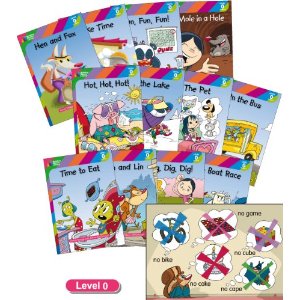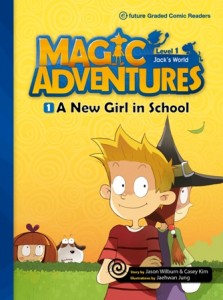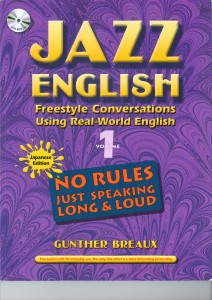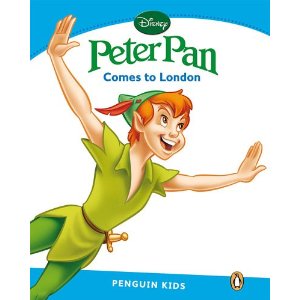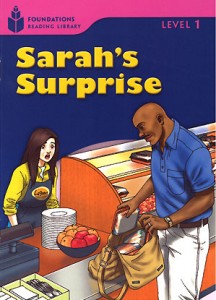Building Blocks Library curriculum EFL eikaiwa ES extensive reading junior high school kids Language learning materials phonics readers Reading Review reviews teaching
by sendaiben
5 comments
Review of MPI’s Building Blocks Library
Full disclosure: I was asked to write some additional readers for this series last year, and they just came out. I’ll try not to be too gushy in this review.
The Building Blocks Library, published by Matsuka Phonics Institute, is a ten level series with 82 titles. The first four levels are written as phonics readers to help students start reading, the ones after that are leveled readers for extensive reading.
The good:
- The same characters appear in many of the books, developing throughout the levels
- Ten levels means that students can move up through the series gradually and read at their level
- The artwork and production values are high and the books are attractive
- Each level comes with a CD of the books read aloud: the CD is well made and the voice acting is good
- Most of the books are interesting with varied story lines
- The series is reasonably priced, especially considering they come with CDs
The bad:
- There are not enough books at each level to meet student needs (this has been partially addressed with the new Level 0 and Level 1A sets, but schools will still need to supplement this with other materials)
- The difficulty outstrips the content at the higher levels, ie they are difficult for ordinary junior high school students to read even though the stories probably appeal to students that age the most
Overall:
This is a very nicely produced series that appeals to students and is economical and easy to integrate for schools. The main drawback is that there are not enough books at each level to allow students to move up the levels smoothly -ideally students would be doing much more reading at each level before moving up so teachers will have to supplement this with other materials.
e-future Graded Comic Readers EFL ES extensive reading high school junior high school kids materials readers Reading reviews
by sendaiben
25 comments
e-future Graded Comic Readers: Magic Adventures
I just received my order of a full set of e-future Graded Comic Readers (Magic Adventures) and am, so far, extremely impressed.
The series consists of 18 comic books over three levels (200, 400, and 600 headwords). The story starts off in our world, then goes into Magic Land, then comes back to the real world. The characters are children and it has a real Harry Potter kind of vibe to it. The artwork is very nice, and the production values are high. They also have exercises and a glossary in the back.
Each book has a CD (not mp3 thankfully) with various tracks: theme song, the story, listen and read, listen and repeat, key words and expressions, then a great one: read the story using prompts, making them ideal for homework or self-study.
The books are comics, so feel very fresh. The students I tried them with today (elementary and junior high school) really liked them and so did I.
This is my find of the week: great, fresh, reading material at a reasonable price (set of 18 is just over 13,000 yen before discounts).
EFL eikaiwa high school junior high school Language learning materials reviews speaking teaching textbooks university
by sendaiben
5 comments
Jazz English
Published by Compass, Jazz English is a speaking textbook for lower-intermediate students. It works very well with junior high school students that have been studying for a while and are ready to take things to the next level in terms of speaking, as well as with high school and I imagine lower level university students. I have only used the first textbook, so this review does not address Jazz English 2, nor the companion workbook (which I am going to try soon).
The textbook consists of ten main units and three supplementary ones, with all units following the same pattern: new vocabulary, conversation prompt questions, a dialogue, a short reading section, a crossword to practice the vocabulary, a short reading task, exercises to support speaking, and a final speaking activity.
The focus of the book is for students to develop more autonomy while speaking, and to try to have longer and more complex conversations. It does this very well, at least in my experience, with students that have a solid base of vocabulary and English exposure, and who are motivated to improve their conversational skills. Our ‘advanced’ classes, consisting of junior high and high school students that have been studying for four or more years took to it very well.
This has been a real find for us this year, and I wholeheartedly recommend it for classes similar to the one described above. The course requires a lot of student input, so this book would not work well with unmotivated or reluctant learners.
Anybody else using Jazz English?
EFL eikaiwa ES extensive reading kids language courses Language learning materials Penguin Kids Readers readers Reading Review reviews school management teaching
by sendaiben
4 comments
Penguin Kids Readers
Resuming our kids’ readers roundup after a brief hiatus 🙂
I received a set of these a couple of weeks ago from the publisher (thanks!). While I appreciate the gesture, it will not affect how I review them here.
Having said that, this is a fantastic new series that has a lot going for it. There are currently 23 readers over six levels of difficulty.
Level 1 (200 headwords)
Level 2 (400 headwords)
Level 3 (600 headwords)
Level 4 (800 headwords)
Level 5 (1000 headwords)
Level 6 (1200 headwords)
As you can see, the jump between levels is fairly minimal, something that is extremely important for beginner and younger readers.
The current titles are all based on Disney films, and the artwork and covers are beautiful. The writing isn’t bad, either, in that the books actually tell coherent stories. That is often a problem with low-level readers based on films or TV content -they try to fit in too much with a minimal wordlist so the stories end up not making sense. Luckily that is not the case here. In many of the books they have taken just one scene from a film and told that. Our students found the books really attractive due to the topics, but there was enough of a spread that they had not seen all of the movies featured.
Another thing I liked were the simple exercises in the back of the books. They have pre-reading and post-reading questions that are visual and fairly easy -perfect to do in class after reading or to check out of class reading. If anything, I would have liked to see this section be slightly longer.
Apparently the series will end up having twelve books at each level, and there will be different content in the next wave of books (ie not just Disney).
Overall, this is a fantastic new resource. We ended up ordering two more sets, and I’m really looking forward to the release of the rest of the books in this series.
curriculum EFL eikaiwa ES extensive reading Foundations Reading Library kids language courses Language learning readers Reading Review reviews school management
by sendaiben
4 comments
Foundations Reading Library
Until now I’ve been focusing on phonics and basic readers. Today I’d like to go to the other extreme and look at a series that bridges the gap between children’s readers and ones aimed at older learners.
The Foundations Reading Library, co-authored by my friend Rob Waring, was revolutionary when it came out. A reader series aimed at teenagers, with minimal headword counts that nevertheless succeeded in being interesting and accessible? I don’t know of any others.
Level one starts with just 50 headwords, so normal junior high school students can have a go at getting through the books. For our students who have come up through phonics and children’s readers, these books are cake.
Foundations Reading Library books are available singly, in level packs, and also in collected anthologies. I only just discovered the latter ones, and they seem fairly promising. They have all the books from that level in one volume, cost about half as much as buying them individually, but have the drawback that you can’t give each book to a different student. The covers also seems flimsier and I’m worried about how well they will last. Still, for some teaching situations, they might be a cheap way to stock up.
You can also get CDs and lesson planners for all the levels, but I don’t have much experience with these.
My thoughts:
1. some of the books are better than others, but overall this series is extremely accessible and interesting for students from elementary school all the way to adults. I also use them with university students and they often come out as the most popular series at low level
2. the gaps between levels are very small, making it easy to progress from one to the next
3. the recurring characters are constant through the series and readers can really get to know them
4. there are nowhere near enough books at each level, and unfortunately there won’t be any new ones coming out
Basically, these books still occupy a fairly unique niche, and they do their job extremely well. I wish there were more of them. Some similar alternatives include the Building Blocks Library, by MPI, and the Page Turners series by Cengage, but they aren’t exactly the same…
Anyone else use Foundations? Did I miss anything?
